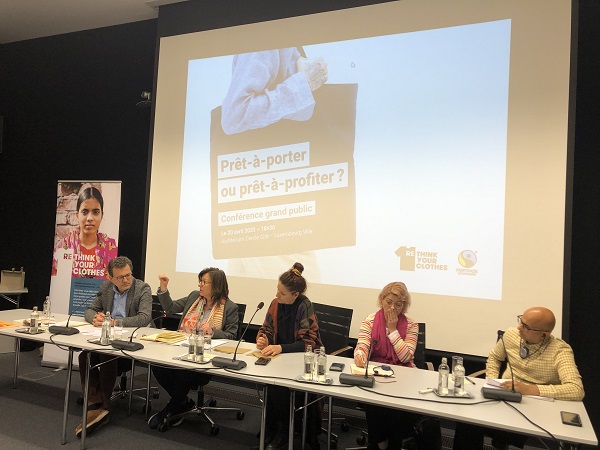 Fairtrade Conference;
Credit: Otilia Dragan/Chronicle.lu
Fairtrade Conference;
Credit: Otilia Dragan/Chronicle.lu
On the evening of Thursday 20 April 2023, the NGO Fairtrade Lëtzebuerg held a conference in English and French, open to the public at the Cercle Cité Luxembourg Auditorium.
Around 45 people were present to learn more about and discuss the dangers and issues surrounding fast fashion. The main issues mentioned were the inhumane exploitation of thirteen million workers in developing countries and the massive use of chemicals, endangering workers, the environment and consumers alike.
Speakers Tilly Metz, Luxembourg member of the European Parliament, Audrey Millet, researcher, lecturer and author (The Black Book of Fashion and the study published in January 2023 “How dangerous are the textiles we wear?), and Amit Narke, CEO of the Fairtrade certified company Purecotz and member of the Asia & Pacific Fairtrade producer network, presented some of the issues at hand.
The conference started with the screening of a short documentary depicting the creation of clothes in Amit Narke’s company, from the organic cotton field to his textile factory in Mumbai. This short film explained that only 1% of worldwide created clothes are certified organic. It depicted the need for change in this now highly problematic industry. The workers’ hands exposed to plucking cotton treated with glyphosate, for instance, turn black and they develop allergies and other health issues. Purecotz was created to guarantee smaller workshops, offering nearby school infrastructure for the workers’ children, and a commitment to paying workers a monthly salary (instead of payment by garment) and fair wages. But this vision depends largely on demand, Mr Narke added, which is not big enough to currently expand this fair business model. “Slow fashion would solve 80% of the problem,” he added.
Audrey Millet gave the audience some statistics, noting that 20% of the Earth’s water pollution coming from the textile industry, with 70% of China’s rivers being impacted and 10% of worldwide carbon emissions coming from the textile production industry. She added that the fashion industry uses over 8,000 chemical products. For example, according to Ms Millet, chromium leads to a 30% augmentation of the risk for cancer in people who work at textile factories where the substance is used.
Tilly Metz stressed the importance of certain obligatory rules being implemented in European law to force the industry to take responsibility for the exploitation overseas and health risks involved for people and the planet. Without such regulations, MEP Metz added, lobbyists would find excuses and big pharmaceutical companies could sponsor studies yielding the results needed to continue making profit. “There need to be clear and mandatory regulations,” Tilly Metz said, calling for coherence in European politics, without which transparency for consumers would not be possible.
The conference ended on a sobering note, with Amit Narke pointing out: “Prices of slow fashion [are] the real price of a garment. The other price is someone [else] paying the price.”








